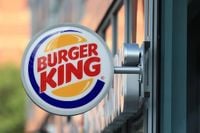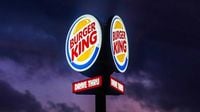A major Burger King franchisee, Consolidated Burger Holdings, has filed for Chapter 11 bankruptcy, a move that has resulted in the closure of several locations in Florida and Georgia. Based in Destin, Florida, the company submitted its bankruptcy filings on April 14, 2025, in the U.S. Bankruptcy Court for the Northern District of Florida. Currently, Consolidated Burger operates 57 Burger King restaurants, with locations stretching from Valdosta, Georgia, to Tallahassee, Florida, including four restaurants located inside Walmart stores.
The decision to file for bankruptcy was not taken lightly. According to court documents, the franchisee has been grappling with significant financial challenges, largely stemming from the COVID-19 pandemic. The filing stated, "The debtors’ business suffered significantly from loss of foot traffic, resulting in declining revenue without proportionate decreases in rental obligations, debt service, and other liabilities." This loss of customer traffic has had a cascading effect on the company’s financial health.
Over the past two fiscal years, the financial situation has worsened. In fiscal year 2023, Consolidated Burger reported sales of $76.6 million, alongside a net operating loss of $6.3 million. The following year, sales dipped further to $67 million, with an amplified operating loss of $12.5 million. These figures highlight the increasing strain on the franchisee, which has been unable to balance its income against its mounting debts.
Despite the bankruptcy filing, Consolidated Burger plans to continue operating its restaurants while actively seeking a buyer for the company and its assets, which are valued at approximately $78 million. Interestingly, the company had been on the lookout for a buyer for seven months prior to filing for bankruptcy, indicating that the financial troubles were not an overnight development.
The broader fast-food industry has also been experiencing turbulence, with rising food and labor costs contributing to the challenges faced by restaurant owners. Fast food chains, including Burger King, have been attempting to attract customers with budget meal deals. For instance, last year, Burger King launched a $5 meal deal promotion, which was reminiscent of similar offerings from competitors like McDonald's.
Interestingly, despite the struggles faced by Consolidated Burger, the Burger King brand itself has shown some resilience. According to QSR, a data monitoring service for quick service restaurants, Burger King outperformed its peers in the fourth quarter of the previous year, achieving a 1.5% increase in same-store sales, compared to a mere 1.2% increase among its competitors. This trend suggests that while franchisees like Consolidated Burger are facing difficulties, the brand as a whole is still managing to attract customers.
In a bid to revitalize its image and improve customer experience, Burger King’s parent company, Restaurant Brands International (RBI), has been investing heavily in restaurant remodeling. Last year, RBI acquired Burger King’s largest U.S. franchisee, Carrols Restaurant Group, for $1 billion, a strategic move aimed at expediting the remodeling process. RBI has committed to spending approximately $2.2 billion on renovations, with the goal of upgrading 85% to 90% of its roughly 7,000 restaurants by 2028. Tom Curtis, Burger King U.S. President, noted, "It was the first time in a long time that RBI had invested a significant amount of capital back into the business to coinvest with franchisees."
As the company continues to navigate its financial difficulties, the broader fast-food landscape remains in flux. The ongoing challenges faced by many franchisees underscore the need for adaptability in an industry that is constantly evolving. While Consolidated Burger Holdings is currently in a precarious position, the proactive steps being taken by its parent company, RBI, to modernize and improve the customer experience may provide a glimmer of hope for the brand's future.
In conclusion, the filing for Chapter 11 bankruptcy by Consolidated Burger Holdings reflects the ongoing challenges faced by many in the restaurant industry. The loss of foot traffic, coupled with increasing operational costs, has created a perfect storm for this franchisee. As they seek a buyer and continue operations during the bankruptcy proceedings, the future remains uncertain. However, the brand's overall performance and the significant investments being made by RBI could pave the way for recovery and revitalization in the fast-food sector.





